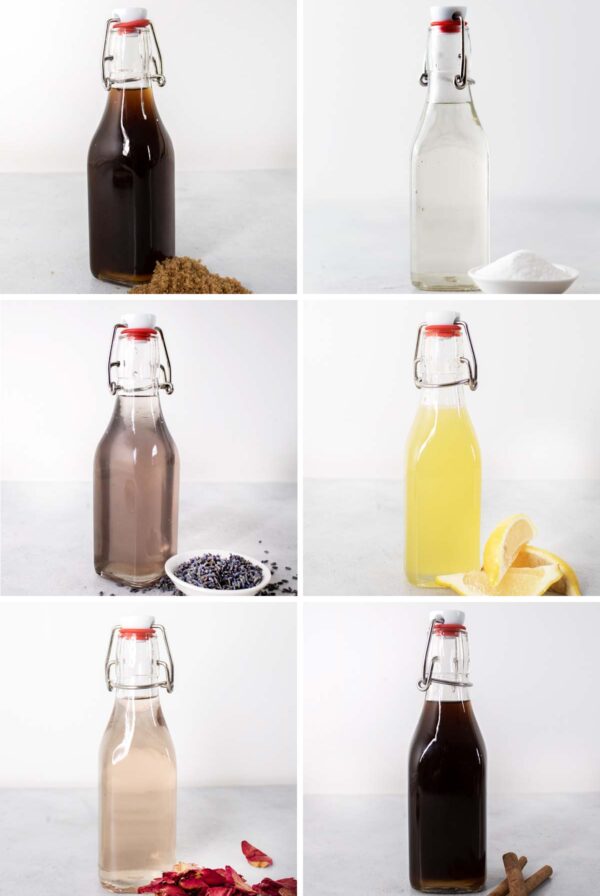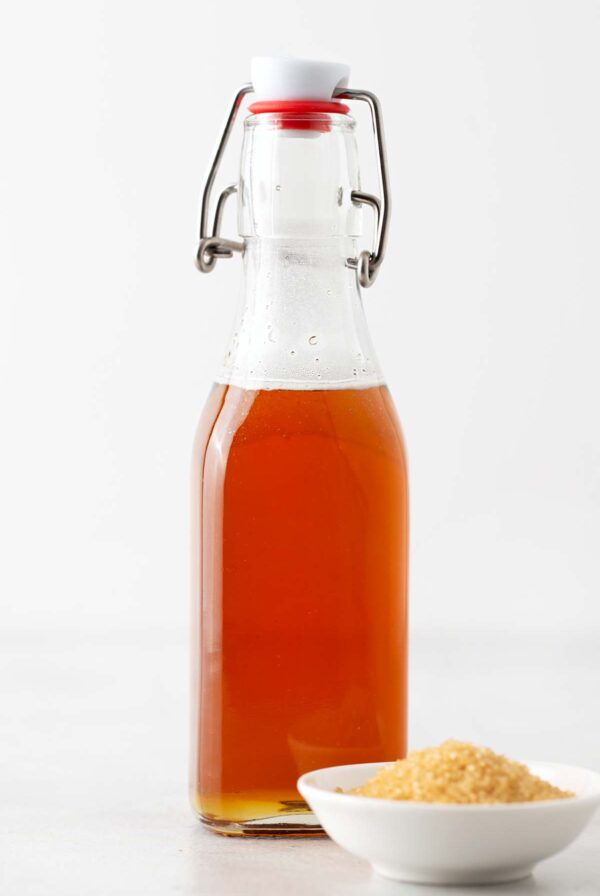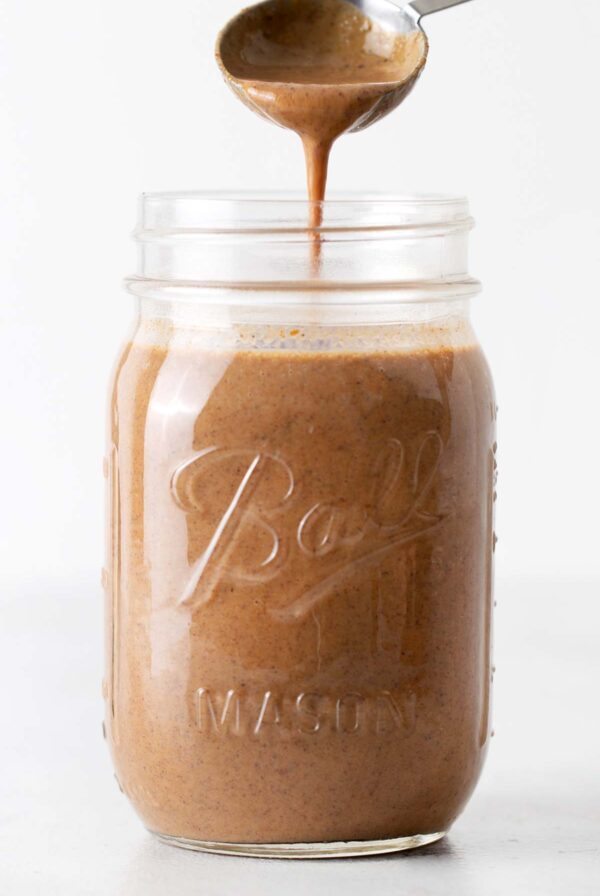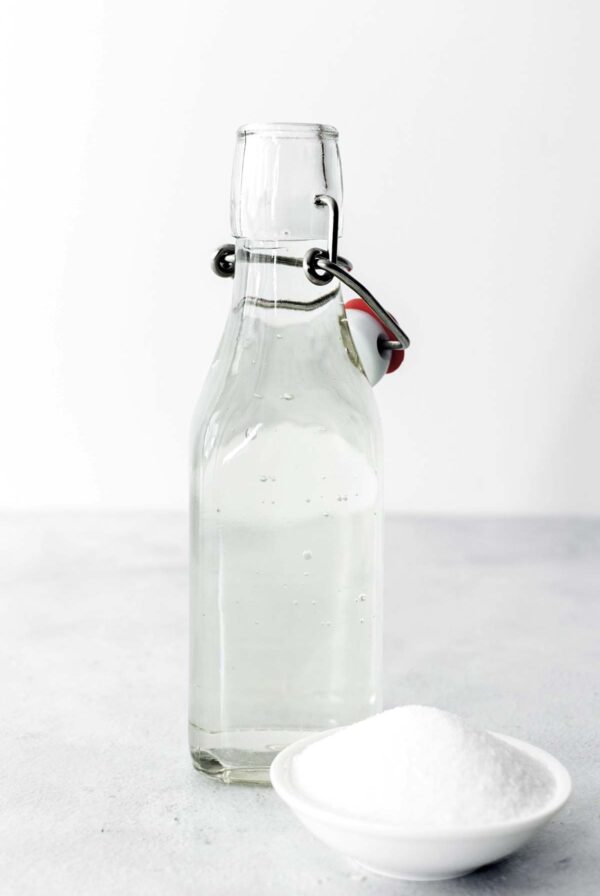Black Tea Health Benefits + How to Brew Properly
on Mar 20, 2023, Updated Oct 21, 2023
This post may contain affiliate links. As an Amazon Associate, I earn from qualifying purchases.
See black tea health benefits and get step-by-step instructions on how to make this tea properly from a Tea Sommelier.
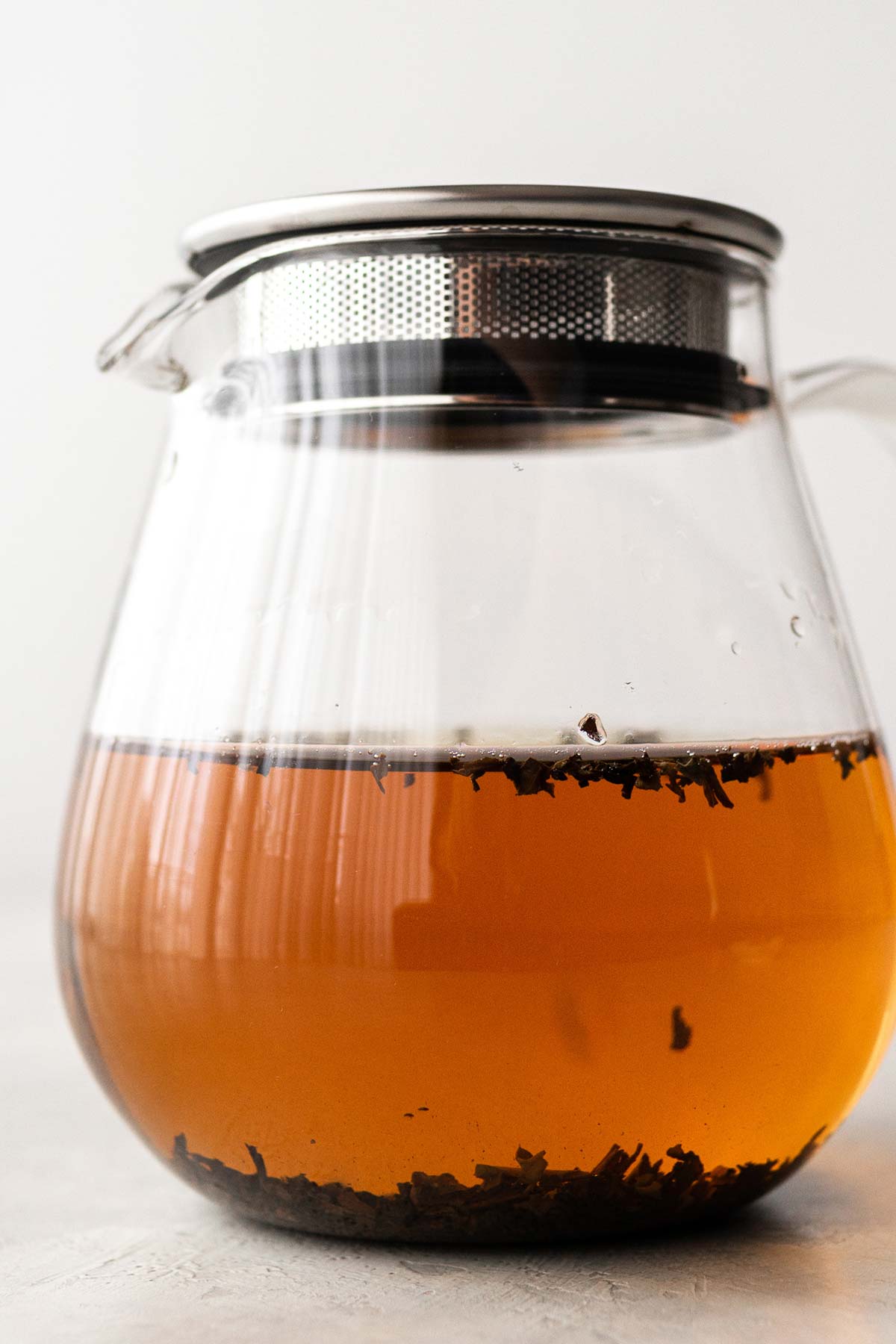
Side Effects of Black Tea
If you’re sensitive to caffeine, use caution when drinking black tea.
Consuming too much caffeine can cause side effects like dizziness, headaches, fast heart rate, or anxiety.
Caffeine can also make it hard to sleep, so be sure to avoid drinking black tea just before bed.
What Is Black Tea?
Black tea is perhaps the most popular and common type of tea that’s enjoyed around the world.
Black tea, green tea, oolong tea, and white tea all come from one plant called the Camellia sinensis and they naturally contain caffeine.
To make black tea, the leaves are plucked from the Camellia sinensis plant and left out to dry and oxidize, a natural process that darkens the leaves.
Oxidation is what gives black tea its reddish, golden color when brewed, along with a stronger, more robust flavor.
Black tea is mainly produced in China (where it originated) and India, but can also be found on a smaller scale in Nepal, Sri Lanka, Vietnam, and in African countries such as Kenya and Nigeria.
Different Black Teas
The following teas are all black teas.
English Breakfast tea: A blend of black teas. Usually had with milk and sugar.
Earl Grey tea: Black tea with beragmot, a citrus fruit.
Chai: Black tea with a blend of spices. (See my chai latte recipe.)
Assam: A bold, robust black tea that’s usually found in Earl Grey and chai. (See how to brew Assam properly.)
Darjeeling: Also known as the “Champagne of teas” because of its delicate fruity aroma.
Ceylon: A versatile tea from Sri Lanka, formerly known as Ceylon, with bright, citrusy flavor that’s great hot or cold. (See how to brew Ceylon properly.)
Lapsang souchong: This Chinese tea has a unique earthy, smoky flavor. (See how to brew lapsang souchong properly.)
Keemun: A Chinese black tea that’s used in a lot of black tea blends like English Breakfast tea.
RELATED: Starbucks Iced Black Tea Copycat Recipe
Top 3 Health Benefits of Black Tea
1. Provides Antioxidants
Black tea contains antioxidants, or beneficial substances that protect cells from damage. This includes compounds called theaflavins, which are responsible for the unique taste and flavor of black tea.
Antioxidants work by fighting harmful molecules known as free radicals. This keeps your cells healthy, potentially reducing the risk of chronic conditions like heart disease and cancer.
2. Supports Immune Function
Black tea can be an important source of nutritional immunity. It can give you a better immune response to harmful organisms or infections.
Black tea also contains nutrients like zinc, selenium, and iron, which are also needed for healthy immunity.
3. Increases Energy
If you’re looking for an energy boost but don’t like coffee, black tea might be an ideal choice.
Black tea contains a moderate amount of caffeine, about 47 milligrams per 8 ounce cup. That’s about half the amount of caffeine in 8 ounces of coffee.
Plus, black tea contains an amino acid called L-theanine, which isn’t found in coffee. L-theanine counteracts the stimulating effects of caffeine, resulting in steady energy without the jitters.
RELATED: 7 Benefits of Drinking Black Tea
Where to Buy Black Tea
My picks for the best places to buy black tea online:
Harney & Sons
Free shipping no matter how small the order! I’m a big fan of their Earl Grey Supreme.
In Pursuit of Tea
Sells high-quality tea (loose tea and tea sachets), bought directly from tea farms.
Amazon
A great place to get black tea in tea bags. I recommend the Twining Black Tea Sampler, Taylor’s English Breakfast tea, and Yorkshire black tea.
Step-by-Step Instructions
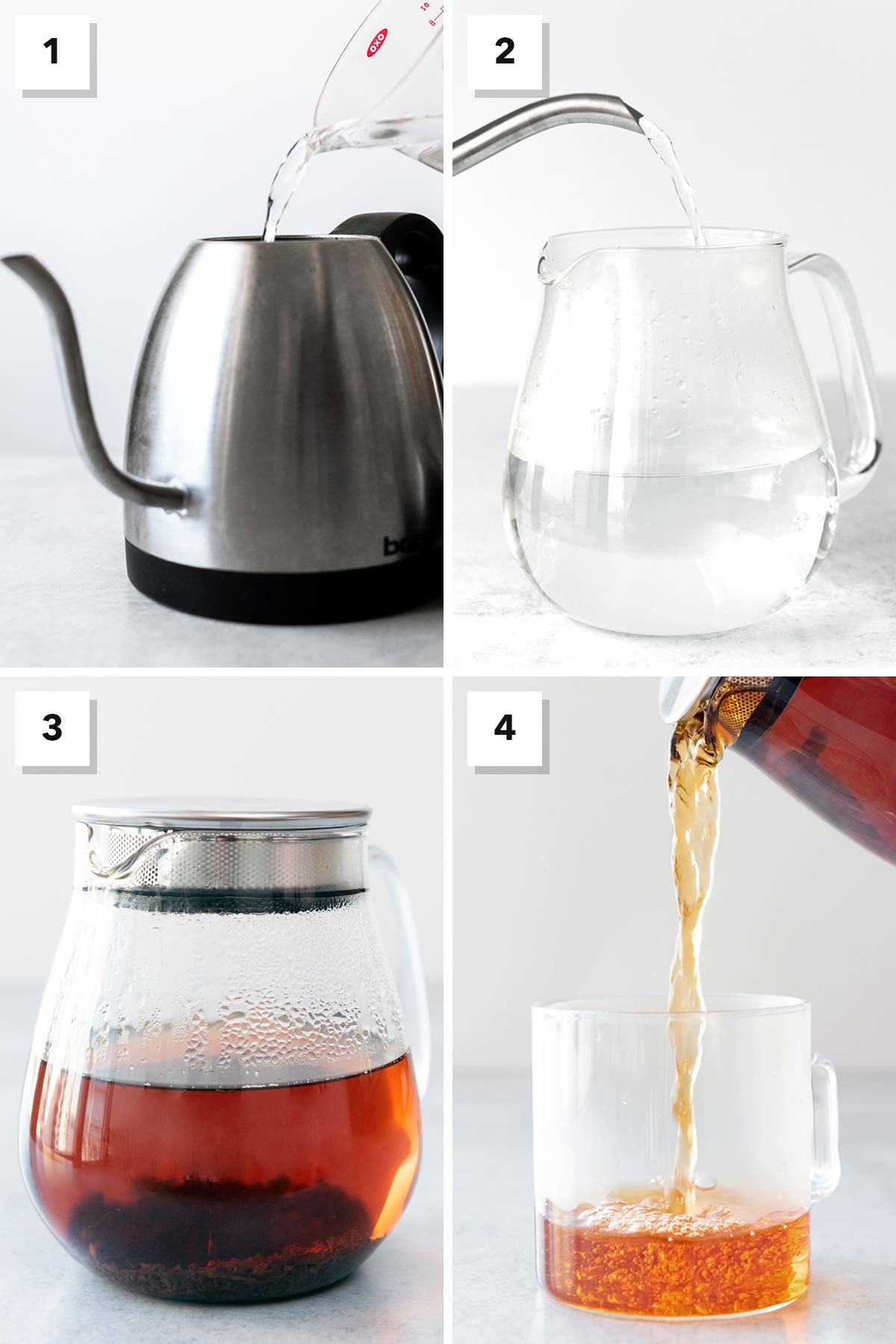
- Boil water.
To get the most accurate water temperature, use an electric kettle with temperature setting. Boil more than needed since you want extra to warm up the teapot. - Warm up teapot.
Swirl hot water around in the teapot, then discard. - Put black tea into the teapot and add hot water. Cover teapot and steep.
Check the tea package to see the steep time. - Strain black tea solids and pour hot tea into a teacup.
Tea Sommelier’s Tips
Don’t oversteep the tea.
Steeping black tea for longer will make the tea bitter. The general rule of thumb for black tea is to steep for no longer than 5 minutes but look at the tea package for steep time recommendations.
Water quality is important.
Clean filtered water makes the best tasting tea because it won’t add any unwanted flavors.
Black tea can be enjoyed in a variety of ways.
You can drink black tea with or without sugar. Black tea is also commonly enjoyed with milk. Classic milk teas that feature black tea include Hong Kong milk tea, chai, and Thai iced tea.
Sample a variety of different black teas, but do it one at a time.
The easiest way to enjoy and learn the nuances of black tea is to drink it often and try different varieties. Select one tea to enjoy daily for a week. After a week, you should be able to taste the tea again later and recognize it. Then, restart the process with a new tea the following week.
RELATED: 10 Tea Sommelier Tips
Questions You May Have
Each variety of black tea has its own distinct taste and intensity, ranging from malty and full-bodied to delicate and sweet to smoky and earthy. Most are often bold, robust, and slightly astringent.
Black tea is caffeinated and the levels will depend on the type. There’s about half the amount of caffeine that’s in coffee.
Black tea has many health benefits and most people can drink it every day. But as with most food and drink, moderation is key, especially if you’re sensitive to caffeine.
Related
- 17 Best Earl Grey Tea Recipes
- Where to Buy Tea Online
- Lavender Iced Tea
- Lemon Iced Tea
- Iced Milk Tea
- Starbucks Iced Black Tea Lemonade
Want to save this info on black tea to Pinterest for later? Pin it now to your Pinterest board!
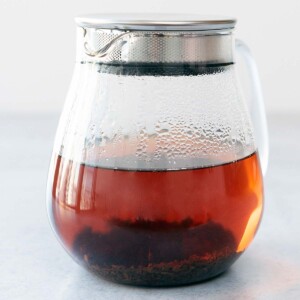
How to Brew Black Tea Properly
Equipment
Ingredients
- 1 cup water, + more to warm teapot
- 1 ½ teaspoons black tea, or 1 tea sachet or tea bag
Instructions
- Boil water.If using an electric kettle with temperature setting, set it to the water temperature listed on the tea package. Black tea is usually steeped in water that's 212ºF. Heat a little more water than needed so that it can be used to warm up the teapot.
- Warm up teapot.Pour some hot water into a teapot and swirl it around. Discard the water.Warming up the teapot is an extra step that all tea professionals take the time to do, so that when the tea steeps, the water temperature won't drop drastically.
- Put black tea into the teapot and add hot water. Cover teapot and steep for 5 minutes.Check the tea package to check your specific black tea's steep time.
- Strain black tea solids and pour hot tea into a teacup.
Notes
- Every type of tea has its own ideal brewing temperature. When it comes to black tea, that range typically falls between 200°F to 212°F. Check the tea package to find the right temperature for the tea you’ve purchased.
- Steeping black tea for longer will make the tea bitter. The general rule of thumb for black tea is to steep for no longer than 5 minutes but look at the tea package for steep time recommendations.
- Clean filtered water makes the best tasting tea because it won’t add any unwanted flavors.
- You can drink black tea with or without sugar and with or without milk.
Nutrition
Nutrition information is automatically calculated, so should only be used as an approximation.
